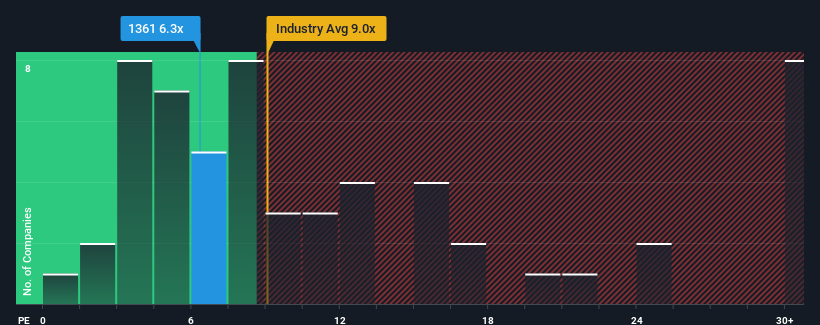Investors Holding Back On 361 Degrees International Limited (HKG:1361)

With a price-to-earnings (or "P/E") ratio of 6.3x 361 Degrees International Limited (HKG:1361) may be sending bullish signals at the moment, given that almost half of all companies in Hong Kong have P/E ratios greater than 9x and even P/E's higher than 18x are not unusual. Nonetheless, we'd need to dig a little deeper to determine if there is a rational basis for the reduced P/E.
Recent times have been advantageous for 361 Degrees International as its earnings have been rising faster than most other companies. It might be that many expect the strong earnings performance to degrade substantially, which has repressed the P/E. If you like the company, you'd be hoping this isn't the case so that you could potentially pick up some stock while it's out of favour.
View our latest analysis for 361 Degrees International

What Are Growth Metrics Telling Us About The Low P/E?
In order to justify its P/E ratio, 361 Degrees International would need to produce sluggish growth that's trailing the market.
Taking a look back first, we see that the company grew earnings per share by an impressive 16% last year. The strong recent performance means it was also able to grow EPS by 104% in total over the last three years. Accordingly, shareholders would have probably welcomed those medium-term rates of earnings growth.
Looking ahead now, EPS is anticipated to climb by 11% per annum during the coming three years according to the analysts following the company. Meanwhile, the rest of the market is forecast to expand by 12% each year, which is not materially different.
With this information, we find it odd that 361 Degrees International is trading at a P/E lower than the market. It may be that most investors are not convinced the company can achieve future growth expectations.
The Bottom Line On 361 Degrees International's P/E
We'd say the price-to-earnings ratio's power isn't primarily as a valuation instrument but rather to gauge current investor sentiment and future expectations.
Our examination of 361 Degrees International's analyst forecasts revealed that its market-matching earnings outlook isn't contributing to its P/E as much as we would have predicted. There could be some unobserved threats to earnings preventing the P/E ratio from matching the outlook. At least the risk of a price drop looks to be subdued, but investors seem to think future earnings could see some volatility.
Before you settle on your opinion, we've discovered 1 warning sign for 361 Degrees International that you should be aware of.
If P/E ratios interest you, you may wish to see this free collection of other companies with strong earnings growth and low P/E ratios.
If you're looking to trade 361 Degrees International, open an account with the lowest-cost platform trusted by professionals, Interactive Brokers.
With clients in over 200 countries and territories, and access to 160 markets, IBKR lets you trade stocks, options, futures, forex, bonds and funds from a single integrated account.
Enjoy no hidden fees, no account minimums, and FX conversion rates as low as 0.03%, far better than what most brokers offer.
Sponsored ContentValuation is complex, but we're here to simplify it.
Discover if 361 Degrees International might be undervalued or overvalued with our detailed analysis, featuring fair value estimates, potential risks, dividends, insider trades, and its financial condition.
Access Free AnalysisHave feedback on this article? Concerned about the content? Get in touch with us directly. Alternatively, email editorial-team (at) simplywallst.com.
This article by Simply Wall St is general in nature. We provide commentary based on historical data and analyst forecasts only using an unbiased methodology and our articles are not intended to be financial advice. It does not constitute a recommendation to buy or sell any stock, and does not take account of your objectives, or your financial situation. We aim to bring you long-term focused analysis driven by fundamental data. Note that our analysis may not factor in the latest price-sensitive company announcements or qualitative material. Simply Wall St has no position in any stocks mentioned.
About SEHK:1361
361 Degrees International
An investment holding company, manufactures and trades in sporting goods in the People’s Republic of China.
Very undervalued with flawless balance sheet.
Similar Companies
Market Insights
Community Narratives




